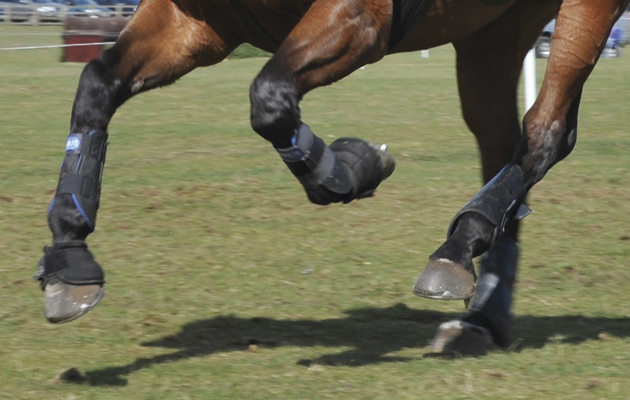Tying-up, or azoturia as it is also known, is a muscle metabolism condition found in horses, often during or after exercise. This results in muscle cramping of the muscle groups along the back and hind-quarters of a horse. The muscles contract and then do not relax causing pain and stiffness. Here’s a bite-size breakdown of this condition.
Clinical signs to look out for
1. Struggling to move
The horse will find it difficult to move its back end or might just change his action slightly. The muscles in the hind-legs are most commonly affected but the triceps above the elbows of the fore-limbs may also show signs of tying-up. If your horse is showing signs of tying-up, stop exercise immediately. If the horse can walk, get him into a stable, but if he can’t don’t force him to walk as you could cause more damage.
2. Pain
The horse will be visibly in pain and will often sweat profusely which means the signs can sometimes be confused with colic. A horse might also paw the ground, and in very severe cases, collapse.
3. Temperature
The temperature of the affected horse might increase to between 40 and 40.5 degrees Celsius.
4. Muscle tension
If you run your hands down either side of the horse’s spine, the muscles will feel very hard and tense, as will the hind-legs.
5. Urine
The horse’s urine might appear to be dark brown/red in colour due to the myoglobin released from the damaged muscle transferring from the blood into the kidneys. This can cause long-term kidney problems and is formally known as rhabdomyolysis which describes the damage occurring to the horse’s muscle fibres.
Causes of tying-up in horses
It is not fully understood why horses tie-up.
Over the years, tying-up has also been known by a variety of other names, such as ‘Monday morning disease’ — a name that comes from the fact that many working horses that had had Sunday off were then affected by azoturia on returning to work on the Monday morning.
The most commonly affected tend to be those fed on a high-energy diet, even when they are having time off from their usual exercise routine.
Some horse’s are more susceptible than others, most notably fillies, where it has been found that their hormonal cycles might be a contributing factor.
Electrolyte imbalance can also cause tying-up.
How to manage a horse that might be prone to tying-up
- Feed a salt and calcium carbonate supplement
- Muscle biopsies can be taken as well as electrolyte testing to help determine an underlying cause
- Minimise stress
- Regular daily exercise
- Turn the horse out as much as possible
- Stick to a routine
- Investigate the affected horse’s diet with an industry professional
You might also enjoy reading these:

H&H Feed Week: the right diet to help prevent horses tying up
Horse & Hound offers some expert feeding advice to help a horse that has previously suffered from azoturia

Subscribe to Horse & Hound magazine today – and enjoy unlimited website access all year round
Would you like to read Horse & Hound’s independent journalism without any adverts? Join Horse & Hound Plus today and you can read all articles on HorseandHound.co.uk completely ad-free



